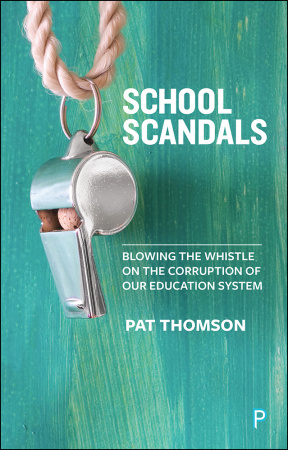'Nepotism, fraud, corruption, waste and cheating ...
Welcome to England's school system'*

Photo: Policy Press
‘With almost daily reports of failings in school management,
what can be done to improve educational outcomes for everyone?
Pat Thomson takes on England’s muddled education system, highlighting failings caused by the actions of ministers in successive governments. While corrupt actions are taken by some, it is predominantly the corruption of the system that is at fault. She exposes fraudulent and unethical practices, including the skewing of the curriculum and manipulation of results, and argues for an urgent review, leading to a revitalised education system that has the public good at its heart.’- Policy Press
......
‘Pat Thomson is uniquely placed to comment on contemporary secondary schooling. Her current position is Professor of Education and convenor of the Centre for Research in the Arts, Creativity and Literacy (CRACL) at the University of Nottingham (United Kingdom).
Prior to taking up her role as an academic in the UK, Pat had more than 20 years experience in SA schools. She held leadership positions in some of our most iconic secondary schools which, in large part, were set up to address significant instances of educational disadvantage. She was the founding coordinator of the Bowden Brompton Community School. She held leadership positions at both The Parks and Paralowie R-12. She was principal of Paralowie for 11 years (1985-1997). Beyond her extensive school leadership experience, Pat also served as President of SASPA, held senior positions in the Department and completed a PhD at Deakin University.
Based on the research for her doctoral thesis, Pat wrote Schooling the rustbelt kids: making the difference in changing times (2002, Allen & Unwin). It was dedicated to the Paralowie community and stands as a definitive and instructive account of the many challenges facing ‘disadvantaged schools
Pat has always been an outspoken defender of public education. This strong political stance has been an acknowledged feature of her role as a principal and in her academic research and writing. On her recent visit to SA she spoke to SASPA principals in February: “Public Education: For the Public Good?” Click here to access Pat’s SASPA address.’- Excerpts from Pat Thomson: a recent visit to South Australia

Photo: SASPA
‘Prof Pat Thomson, known for her award-winning work on creativity, the arts and education, has quietly been on a darker mission: for the past six years behind the scenes she has been collecting reports of what she calls corruption in the school system.
Academy sponsors siphoning off money from school budgets, teachers fiddling test results and heads claiming unlawful bonuses are not just a case of a few bad apples, she claims. Instead, says the professor of education at the University of Nottingham, such dishonesty and greed are evidence of the unethical system in which schools work.
Her 3,800 examples of bad practice, mainly from England but also from other countries where market forces have been injected into public services, tell a story of nepotism, fraud and cheating. In England, they also highlight structural “reform”, with its waste of money on free schools that never open, the horrendous ongoing costs of successive private finance initiatives (PFIs), and the way schools are pitched against each other for survival.
But the source lies at the heart of governments that have allowed spin and perception to replace decisions for the public good, she says.
She has written a book on her findings, explaining how what she regards as corrupt practices are built into the system through competition, market forces and wasteful procurement. Although most people work ethically within this corrupted system, the book provides ample opportunities for the less honest to further their own or their school’s interests if they think they can get away with it. She gives the example of the boss of an academy telling teachers to cheat in tests, and the widespread off-rolling of students to improve schools’ results.
What the country needs is an independent public commission to start the conversation about what we think a school system should be doing and how best to educate young people for the future, instead of focusing on fiddling with school types and the curriculum, she argues.
“Money urgently needed in schools has been spent on tinkering with the system, structural change that doesn’t alter what happens in the classroom between students and their teachers,” she says.
A prolific researcher, journal author and enthusiastic blogger, Thomson usually visited schools with successful teaching and learning but felt unable to ignore the disastrous events she saw across the wider system, such as the bullying of staff by heads buckling under pressure to improve results at any cost.
Included in her hit list of bad practices are failed government initiatives that deprive schools of badly needed cash. Malmesbury school in Wiltshire, for example, has to pay £40 a month for “managing” a canteen bench bought by PFI, on top of installation costs. With 13 years of the contract still to run, it works out at £6,240 just for its “management”.
Thomson lays the blame at the top of government. “We have been living with this culture of spin and deceit for a long time,” she says. “I’ve continued to collect examples and now have many more than 3,800 – one of my three clips last week was a decision by the Office for Statistics Regulation to uphold a complaint that Boris Johnson was misusing statistics on child poverty.” Johnson said there were 400,000 fewer families living in poverty now than in 2010, a claim found to have no factual basis.
“If the prime minister manipulates statistics and the Department for Education is being told off several times for not using statistics appropriately, then you can see right at the top is a culture that says it is acceptable to massage the figures and do what you can get away with,” she says.
Unless policy agendas are framed by a commitment to the public good and structured and regulated accordingly, there will be corrupt behaviour and practices, she warns.
So does that excuse the head who gave a contract to his mother’s firm or the academy trust that claimed hundreds of thousands of pounds for school repairs it didn’t carry out? No, but it’s important to look at the root causes, she says. Raising money for buildings and repair through PFI, with its expensive ongoing costs borne by schools, and bringing market forces into education through contracting out resources and services once provided by democratically elected bodies, have created opportunities for fraud, she says.
She is most worried about England but she sees the same disreputable practices eating into education systems in countries such as the US and Australia, where she was born and worked as a teacher and head before moving into academia at the University of South Australia.
The pressure on schools in England surprised her when she moved to the University of Nottingham in 2003. “I was shocked when I arrived by the punitive regime of inspection,” she says. “In my very first class, which was a master’s class of mostly headteachers, one introduced herself saying ‘Hello, I’m a failed headteacher’. It upset me that someone should take on that as their identity.
“Then I started to see waste of money, not at school level, but higher up with people spending a lot on schools that never opened, while those that were open were having to cope with the most appalling buildings,” she says.
Critical though she is of the Conservative government, she acknowledges waste was rife under Labour too. For example, the Blair government’s early academies cost on average £3m over budget, with the shortfall covered by the government, not sponsors, according to the National Audit Office.
She regards the scandalous costs of PFI as corruption, citing the new school in Liverpool built with private finance that failed to attract enough pupils and closed, but continued to cost £12,000 a day, with Liverpool council facing a £25m bill to buy itself out of the PFI contract. A teacher tells her how “management” of a new sink has cost the school £88 a year for the past 14 years. With nine years left on the PFI contract, that one sink will have cost £2,024.
Despite Thomson’s concern, she is not calling for academy status to be abolished or Ofsted scrapped. What the country needs is for the government to be “re-moralised” and the civil service reorganised so that public resources are used in the interest of all.
“The call is now even more urgent to a world living with the aftermath of Covid-19,” she says. “The private has been elevated over the public good. We need to think now about how we might do things differently, how the government might forge a new contract with the public to organise the nation in the best interests of all of us. A commission could bring together everyone in education to foster a renewed sense of solidarity and trust.”
But can 3,800 examples and one book turn the tide? “I don’t imagine this book is going to do a lot by itself but it could get people talking. I hope it will inform debates about what might be done now to help save teachers and students from a school system bruised from decades of political pet policies and projects,” she says.
* This article by Liz Lightfoot was first published in The Guardian on 8 September 2020.
......
Fixing What’s Wrong with Education
Now I have a question for you, dear readers and friends of the GCGI
Please close your eyes for a moment and think about some of our politicians over the last few decades, Thatcher, Major, Blair, Cameron, May, Johnson, Osborne, Gove, Jacob Rees-Mogg,..., and of course not forgetting Nigel Farage and Dominic Cummings, to name but a few.
Can you ever recall them engaging with us, sharing and answering questions of significance and value? Questions about life's bigger picture:
What is Education? What is Knowledge? What is Wisdom? What is Beauty? What is Justice? What is Love? What is Philosophy? What is Humanity? What is Nature? What is Art? What is Culture? What is the World? What is a University? What is a School? What is Literature? What is Poetry? What is Life? What is Teaching? What is Work? What is Vocation? What is Money? What is for the Common Good? What is Kindness? What is Humility?...
So my friends, how on earth can they give leadership to education? How on earth can they inspire anything or anybody to be good, values-led and a shininglight to build a better education and a better person?
You may wish to see the link below and read further on these questions and more and discover the path to an alternative education model that may empower us to address some the issues noted by Prof. Thomson and others.
Wisdom and the Well-Rounded Life: What Is a University?
……
Thank you very much Prof. Thomson for this excellent and timely study. The nation owes you a debt of gratitude.
As a retired academic colleague, may I please share the following with you:
Although our universities are very lucky and privileged to have academics such as yourself, we must, however, never forget that there are also many guilty academics who are responsible for this moral and spiritual decline in our country by being the cheerleaders for neoliberalism and the values-free education.
I will be most grateful if you would kindly have a look at the link below:
To All Striking Academic Colleagues in Britain: Turn the Strike to a Force for the Common Good
......
...And finally, the fundamental question at this moment is: Can education find its transformative roots again, be reformed and become for the common good?
The answer to my mind is an emphatic NO, unless the following is understood and addressed accordingly:
To reverse this destructive path we need a different model of education and we need a different economic value and economy. However, these are not possible to achieve so long as The Fraudulent Ideology reins supreme. Full stop. Carpe Diem!
Why Love, Trust, Respect and Gratitude Trumps Economics
And These are My Ten Steps to Make the World Great Again
......
GCGI Vision for Education: Serving the Common Good
Look All Around You and Pursue the Common Good
In the midst of economic, social, political, moral and spiritual challenges, we need a vision for what we think education is for. We must come together and recognise that education is something deep and rich for the common good.
Since the rise of Thatcher and her poisonous ideology of neoliberalism and her promotion of individualism, selfishness, arrogance, narcism, feral competition, and such like, we have forgotten the art of knowing what it means to pursue the common good.
Given what was highlighted above on the eruption of corruption with its costly and tragic consequences, leading to our divided country and polarised politics, we must endeavor to set aside our own narrow interests, ideological agenda and partisan differences to work together for the good of the whole society.
If we cannot work together as one nation for the good of all in this time of crisis, for sure we will fail a fundamental human, moral and spiritual test as a people. Carpe Diem!
Look All Around You and Pursue the Common Good
......

